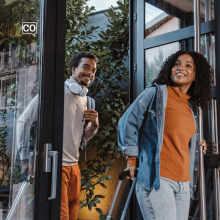Llegar (to arrive) - Pretérito imperfecto, indicativo (Imperfect Past, indicative) - Spanish

Llegar - Conjugation of to arrive in Spanish: Conjugation table, examples and exercises in the imperfect past, indicative tense (Pretérito imperfecto, indicativo).
Pretérito imperfecto, indicativo (Imperfect Past, indicative)
All conjugations and tenses: Llegar (to arrive) - conjugation and tenses - (Spanish)
Syllabus: Spanish lesson - Decir la hora y leer el reloj. (Telling the time and reading the clock)
Conjugation of to arrive in Pretérito imperfecto
- yo llegaba I was arriving
- tú llegabas You arrived
- él/ella llegaba he arrived
- nosotros/nosotras llegábamos we arrived
- vosotros/vosotras llegabais you arrived
- ellos/ellas llegaban they arrived
Example phrases
- Yo llegaba temprano a la escuela. I used to arrive early at school.
- Tú llegabas siempre antes que nosotros. You always arrived before us.
- Él llegaba cansado después del trabajo. He used to arrive tired after work.
- Nosotros llegábamos juntos a la fiesta. We used to arrive together at the party.
- Vosotros llegabais primero al evento. You all used to arrive first at the event.
- Ellos llegaban a casa para la cena. They were arriving home for dinner.
Exercise: Conjugate the verbs - llegar (to arrive)
Instruction: Choose the correct word, read the sentence out loud and translate.
Show answers Show translationLlegar (Pretérito imperfecto, indicativo)
1. Vosotros ... primero al evento.
2. Yo ... temprano a la escuela.
3. Nosotros ... juntos a la fiesta.
4. Ellos ... a casa para la cena.
5. Él ... cansado después del trabajo.
6. Tú ... siempre antes que nosotros.